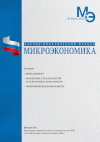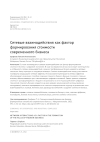Network interactions as a factor in the formation of the value of modern business
DOI: 10.33917/mic-6.107.2022.32-42
The article analyzes network interactions as a factor in the formation of business value in the digital economy. In the course of the study, the author analyzes the advantages and features of network interactions within platform business models and business ecosystems. The author comes to the following conclusions. Network interactions between platform participants produce network effects. Taking advantage of network effects is changing the way business value is created. Data is becoming the main asset that ensures the growth of the capitalization of digital companies. Links of the value chain are transformed into modules and embedded in networks. Under the influence of digital technologies, business value is created at all levels of the economic system (including the nanolevel), companies are turning from static hierarchical structures into dynamic networks of interconnected players, and the role of company management in creating business value is changing.
References:
1. Lenin V.I. Imperialism as the highest stage of capitalism. Full coll. op. Moscow: Publishing house of political literature, 1973. T. 27. pp. 299–426.
2. Galbraith J.K. New industrial society. Favorites. Moscow: Eksmo, 2008. 1200 p.
3. Best M. New competition. Institutes of industrial development. Moscow: TEIS, 2002. 356 p.
4. Porter M. Japanese economic model: Can Japan compete? / M. Porter, H. Takeuchi, M. Sakakibara; Per. from English. Moscow: Albina Business Books, 2005. 262 p.
5. Belyaeva I.Yu. Capital of financial and industrial corporate structures: theory and practice / I. Yu. Belyaeva, M. A. Eskindarov. Moscow: INFRA-M, 2001. 399 p.
6. Eskindarov M.A. Development of corporate relations in the modern Russian economy. Moscow: Respublika, 1999. 366 p.
7. Granovetter M. Economic Action and Social Structure: The Problem of Embeddedness // American Journal of Sociology. 1985;91. URL: https://www.jstor.org/stable/2780199?seq=1#page_scan_tab_contents
8. Granovetter M. Economic institutions as social constructors // Journal of sociology and social anthropology. 2004;8(1):77-80. (In Russ).
9. Ananyin O.I., Odintsova M.I. Methodology of economic science: modern problems and trends // Sources, Vol. 4. Moscow: IE RAN, 2000, pp. 135-136.
10. Williamson O.I. Economic Institutions of Capitalism: Firms, Markets, “Relational” Contracting / Scientific Editing and Introductory Article by V.S. Katkalo; per. from English. Yu.V. Blagov, V.S. Katkalo, D.S. Slavnova, Yu.V. Fedotova, N.N. Tsytovich. St. Petersburg: Lenizdat; CEV Press, 1996. 702 p.
11. Oleinik A. Model of network capitalism // Questions of Economics. 2003;8:132–149. (In Russ.).
12. New post-industrial wave of the West. Anthology / Ed. V.L. Inozemtseva. Moscow: Academia, 1999. 640 p.
13. Kats M.L. Network externalities, competition and compatibility / M.L. Katz, K. Shapiro // Milestones of economic thought. T. 5. Theory of industrial markets / Ed. A.G. Slutsky. St. Petersburg: School of Economics, 2003. pp. 500–535.
14. Arthur W.B. Complexity theory in economic science: other foundations of economic thinking / U.B. Arthur // TERRA ECONOMICUS. 2015;13(2):15-37.
15. Zeng M. Alibaba and smart business of the future: How the digitization of business processes has changed the way we look at strategy / Zeng Ming; Per. from English. Moscow: Alpina Publisher, 2019. 320 p.
16. Powell W. Networks and economic life / W. Powell, L. Smith-Dore; translation by M.S. Dobryakova // Economic sociology. 2003;4(3):61–105.
17. Goldin I. Risk and Complexity / I. Goldin, Ch. Kutarna // Finance & Development. 2017;54 (September):46–49.
18. Means G. Metacapitalism and the revolution in electronic business: what will companies and markets be like in the 21st century / G. Means, D. Schneider; Per. from English. Moscow: Alpina, 2001. 263 p.
19. Transformation of the business model / Per. from English. M.: Alpina Publisher, 2021. 170 p.
20. Parker D. Platform revolution: how network markets are changing the economy – and how to make them work for you / D. Parker, M. van Alstyn, S. Chaudary; per. from English. E. Ponomareva. Moscow: Mann, Ivanov and Ferber, 2017. 302p.
21. Lee Kai-fu. The superpowers of artificial intelligence. China, Silicon Valley and the New World Order / Kai-Fu Lee; per. from English. N. Konstantinova. Moscow: Mann, Ivanov and Ferber, 2019. 233 p.
22. Smorodinskaya N.V. Globalized economy: from hierarchies to a network structure. M.: IE RAN, 2015. 344 p.
23. Gómez Prieto J. Smart Specialization in the world, an EU policy approach helping to discover innovation globally / Gómez Prieto J., Demblans A., Palazuelos Martínez M. Luxembourg: Publications Office of the European Union, 2019.



